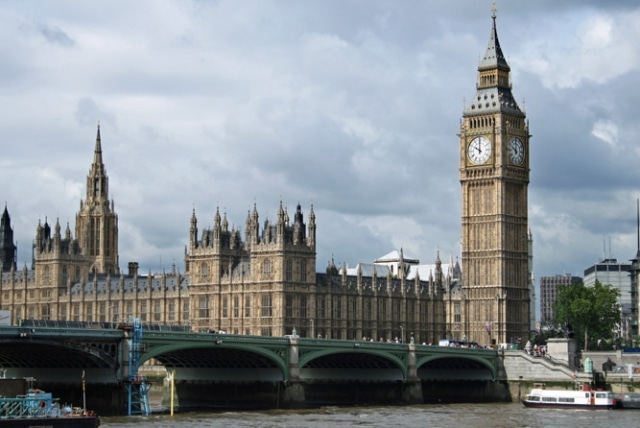This has been cross-posted from Carbon Brief
The UK‘s closest election in a generation is now three weeks away. Carbon Brief is tracking the climate and energy content of the parties’ manifestos as they are launched.
Labour went first on Monday 13 April, followed a day later by the Conservatives and Greens. The Liberal Democrats and the UK Independence Party launched on Wednesday 15 April. Other parties followed over the following week.
In contrast to 2010, climate change has barely featured on the campaign trail so far. That’s despite – or perhaps because of – the joint climate pledge from the leaders of the three largest parties. This promised to work towards a legally-binding global climate deal, to agree new UK emissions-cutting goals and to phase out unabated coal-fired power.
Carbon Brief’s climate and energy tracker will be updated through the week as the manifestos come in, allowing party policies to be compared side by side.
Labour’s Manifesto
In a speech launching Labour’s manifesto, Ed Miliband made just one mention of climate change. He said:
“To tackle problems from terrorism to climate change and because we are at our best when we are confident in the world, our future lies inside not outside the European Union.”
The Labour manifesto document, titled ” Britain can be better”, mentions climate change 13 times, against 28 mentions of budget and 169 for work, workers or working. It reprises Labour’s previously agenda-grabbing energy bill freeze, though this policy has started to lose its shine as wholesale prices have started to fall.
On 20 April Labour launched a separate Green Plan with greater detail on its climate, energy and natural environment proposals. It calls carbon capture and storage “a necessity, not an option”.
Conservatives on Climate Change
For their part, the Conservatives have long appeared to be doing their best to avoid discussing climate change. Their manifesto mentions climate change five times, shale gas three times and uses the word “plan” 121 times. In his speech launching the document, David Cameron mentioned North Sea energy but not climate or carbon.
Polling of MPs suggests his party has a climate-skeptic underbelly and some of the its own MPs say it lacks an energy policy. Meanwhile many of its big green hitters are departing after the election, from former energy minister Greg Barker to prominent green Tim Yeo.
The Liberal Democrats meanwhile have been trying to win green votes with their Green Magna Carta, a set of five green laws mentioned on the front cover of their manifesto. Targets would include making the UK zero-carbon by 2050.
Lib Dem ‘Opportunities’
The Liberal Democrat manifesto, titled “Opportunity for Everyone”, mentions climate 31 times and uses the word “green” 69 times. Its discussion of energy bills emphasises energy efficiency as the way to tackle the problem.
The Plaid Cymru manifesto has a relatively sparse three mentions of climate change but a strong focus on renewable energy for Wales and a plan for a Welsh Climate Change Act setting separate carbon targets.
UKIP‘s Welsh leader was pilloried by his election opponents for claiming climate change is not man made. UKIP‘s previous energy policy documents have variously claimed the Dark Ages was a climatic period and strongly backed fracking.
The UKIP manifesto steers clear of the causes of climate change while promising to scrap the Climate Change Act, “get fracking” and “rejuvinate the coal industry”. An ” independent economic review” of the plans shows UKIP would abolish the Department for Energy and Climate Change.
Cutting Emissions
The Scottish National Party has traditionally backed ambitious climate targets north of the border but is also keen on exploiting North Sea oil and gas. Its full manifesto has yet to be launched. Its manifesto says the UK should adopt Scotland’s 2020 climate target for a 42% reduction against 1990 levels.
The Green Party manifesto, titled ” For the Common Good”, says the UK should cut emissions to 10% of 1990 levels by 2030 and promises £85 billion of public investment in renewables, energy efficiency and flood defence.
The manifesto of Northern Ireland’s Democratic Unionist Party (DUP) is extremely light on relevant content, with a single mention of energy and no reference to climate change, renewables or the word “green”. Carbon Brief turned to the DUP‘s environment policy webpage for clues on its thinking.
There is already plenty of speculation around whether a Labour or Conservatives government would be better for the environment or whether an SNP/Labour coalition would be more favourable to renewables. Other commentators have attempted to find the key energy and climate dividing lines between the parties.
The Climate Group has asked a series of questions around climate and energy to the seven parties that were part of the leaders’ TV debate. Most of the answers repeat lines from the manifestos but the answers around coalition are worth reading. The answers also show UKIP would oppose a UN climate deal in Paris.
The BBC has a very brief summary of the parties’ environmental positions. Those with longer memories might enjoy Carbon Brief’s summary of the parties’ climate and energy policies from last year.
Climate and energy seem unlikely to sway this unusually close and unpredictable election. Yet from the UK‘s future energy mix to the EU‘s influence at UN climate talks, the May 7 election could have far-reaching consequences.
Photo: Alan Cleaver via Flickr
Subscribe to our newsletter
Stay up to date with DeSmog news and alerts







